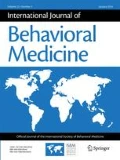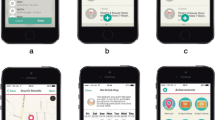Abstract
Purpose
Mobile applications (apps) have created new opportunities in the field of alcohol dependence (AD) within new paradigms of shared decision-making and self-management. The aim of this study is to report the results of a pilot study testing the usability of and satisfaction with a mobile app (called SIDEAL) in AD patients.
Methods
Adult AD outpatients were included. SIDEAL was installed on patients’ personal phones. The Timeline Followback (TLFB) method for the preceding 6 weeks was administered both at baseline and after 6 weeks (end of the study). Self-reports from the app were also assessed at the end of the study and compared to data provided by the TLFB. An online questionnaire about usability and satisfaction was administered to participants after completion of the study. Exploratory efficacy analyses were conducted.
Results
Twenty-four patients were included (mean age 48 years (SD 11.3), women 50%). Most patients (22/24) selected a goal to reduce their consumption. Patients used the self-register module of the app for an average of 80% of the study days. The consumption and medication self-register modules were the most valued, as along with the weekly feedback provided by the app about participants’ weekly rate of usage. Participants’ satisfaction with the app was high. Significant reductions were observed in alcohol consumption (binge drinking days in the last 6 weeks declined from 25 (SD 18.6) to 5.8 (SD 8), p < 0.001; mean daily alcohol consumption in standard units declined from 6.5 (SD 4.3) to 1.9 (SD 1.8), p < 0.001). On most days (88%), patients achieved their self-imposed objectives.
Conclusion
SIDEAL is a well-accepted and highly used app by AD patients that could improve their efficacy in managing their AD. Further larger, randomized studies are warranted.

Similar content being viewed by others
References
Rehm J, Mathers C, Popova S, Thavorncharoensap M, Teerawattananon Y, Patra J. Global burden of disease and injury and economic cost attributable to alcohol use and alcohol-use disorders. Lancet. 2009;373:2223–33.
Roerecke M, Gual A, Rehm J. Reduction of alcohol consumption and subsequent mortality in alcohol use disorders. J Clin Psychiatry. 2013;74:e1181–9.
Weaver ER, Horyniak DR, Jenkinson R, Dietze P, Lim MS. “Let’s get wasted!” and other apps: characteristics, acceptability, and use of alcohol-related smartphone applications. JMIR mHealth uHealth. 2013;1:e9.
Gustafson DH, McTavish FM, Chih M-Y, Atwood AK, Johnson RA, Boyle MG, et al. A smartphone application to support recovery from alcoholism: a randomized clinical trial. JAMA psychiatry. 2014;71:566–72.
Dulin PL, Gonzalez VM, Campbell K. Results of a pilot test of a self-administered smartphone-based treatment system for alcohol use disorders: usability and early outcomes. Subst Abus. 2014;35:168–75.
Goss C, Moretti F, Mazzi MA, Del Piccolo L, Rimondini M, Zimmermann C. Involving patients in decisions during psychiatric consultations. Br J Psychiatry. 2008;193:416–21.
Joosten EA, de Jong CA, de Weert-van Oene GH, Sensky T, van der Staak CP. Shared decision-making reduces drug use and psychiatric severity in substance-dependent patients. Psychother Psychosom. 2009;78:245–53.
Miller WR, ROLLNICK S. Motivational Interviewing Third Edition Helping People Change. 3rd ed. 2012.
Barrio P, Ortega L, Bona X, Gual A. Development, validation, and implementation of an innovative mobile app for alcohol dependence management: protocol for the SIDEAL trial. JMIR Res Protoc. 2016;5:e27.
Sobell LC, Toneatto T, Sobell MB, Leo GI, Johnson L. Alcohol abusers’ perceptions of the accuracy of their self-reports of drinking: implications for treatment. Addict Behav. 17:507–11.
Lund A. Measuring Usability with the USE Questionnaire. STC Usability SIG Newsletter; 2001. p. 2.
Gastfriend DR, Garbutt JC, Pettinati HM, Forman RF. Reduction in heavy drinking as a treatment outcome in alcohol dependence. JSubstAbuse Treat. 2007;33:71–80.
Hoeppner BB, Stout RL, Jackson KM, Barnett NP. How good is fine-grained timeline follow-back data? Comparing 30-day TLFB and repeated 7-day TLFB alcohol consumption reports on the person and daily level. Addict Behav. 2010;35:1138–43.
Searles JS, Helzer JE, Walter DE. Comparison of drinking patterns measured by daily reports and timeline follow back. Psychol Addict Behav. 2000;14:277–86.
Ye Y, Bond JC, Cherpitel CJ, Borges G, Monteiro M, Vallance K. Evaluating recall bias in a case-crossover design estimating risk of injury related to alcohol: data from six countries. Drug Alcohol Rev. 2013;32:512–8.
Adamson SJ, Heather N, Morton V, Raistrick D. Initial preference for drinking goal in the treatment of alcohol problems: II. Treatment outcomes. Alcohol Alcohol. 2010;45:136–42.
Dulin PL, Gonzalez VM, King DK, Giroux D, Bacon S. Smartphone-based, self-administered intervention system for alcohol use disorders: theory and empirical evidence basis. Alcohol Treat Q. 2013 Jan;31
McTavish FM, Chih M-Y, Shah D, Gustafson DH. How patients recovering from alcoholism use a smartphone intervention. J Dual Diagn. 2012;8:294–304.
López-Pelayo H, Wallace P, Segura L, Miquel L, Díaz E, Teixidó L, et al. A randomised controlled non-inferiority trial of primary care-based facilitated access to an alcohol reduction website (EFAR Spain): the study protocol. BMJ Open. 2014;4:e007130.
Danielsson A-K, Eriksson A-K, Allebeck P. Technology-based support via telephone or web: a systematic review of the effects on smoking, alcohol use and gambling. Addict Behav. 2014;39:1846–68.
Bernhardt JM, Usdan S, Mays D, Arriola KJ, Martin RJ, Cremeens J, et al. Alcohol assessment using wireless handheld computers: a pilot study. Addict Behav. 2007;32:3065–70.
World Health Organization. Global status report on alcohol and health 2014. Available from: http://apps.who.int/iris/bitstream/10665/112736/1/9789240692763_eng.pdf?ua = 1.
Lord S, Moore SK, Ramsey A, Dinauer S, Johnson K. Implementation of a substance use recovery support mobile phone app in community settings: qualitative study of clinician and staff perspectives of facilitators and barriers. JMIR Ment Health. 2016;3(2):e24. doi:10.2196/mental.4927.Published online 2016 Jun 28
James H, Ford II, Alagoz E, Dinauer S, Johnson KA, Pe-Romashko K, David H. Gustafson.Successful organizational strategies to sustain use of A-CHESS: a mobile intervention for individuals with alcohol use disorders. J Med Internet Res. 2015;17(8):e201. doi:10.2196/jmir.3965.Published online 2015 Aug 18
Author information
Authors and Affiliations
Corresponding author
Ethics declarations
Conflict of Interest
Pablo Barrio received honoraria from Lundbeck and Pfizer, which are unrelated to the present study. While conducting the study, Antoni Gual received an economic grant from Lundbeck, D&A Pharma and TEVA as well as funding from Lundbeck, D&A Pharma and Abbivie, which are not connected to the work presented. Hugo López-Pelayo received travel grants from Lundbeck, Lilly, Janssen, Pfizer, Rovi and Esteve. Lluisa Ortega has no conflicts of interest to declare.
Ethical Approval
All procedures performed in studies involving human participants were in accordance with the ethical standards of the institutional and/or national research committee and with the 1964 Helsinki Declaration and its later amendments or comparable ethical standards.
Informed Consent
Informed consent was obtained from all individual participants included in the study.
Role of Funding Sources
The design and production of the app was funded by Lundbeck SA. There was no funding for the pilot study nor for the preparation of this manuscript.
Rights and permissions
About this article
Cite this article
Barrio, P., Ortega, L., López, H. et al. Self-management and Shared Decision-Making in Alcohol Dependence via a Mobile App: a Pilot Study. Int.J. Behav. Med. 24, 722–727 (2017). https://doi.org/10.1007/s12529-017-9643-6
Published:
Issue Date:
DOI: https://doi.org/10.1007/s12529-017-9643-6




